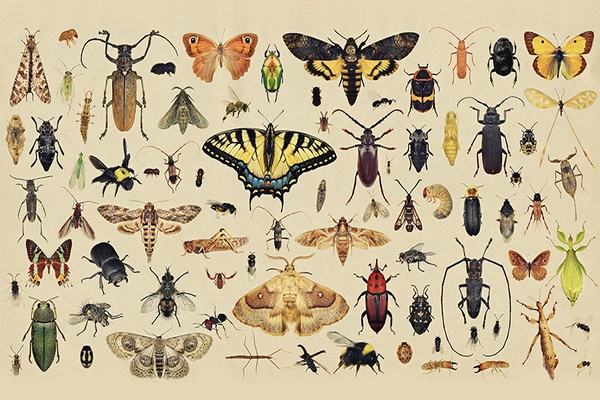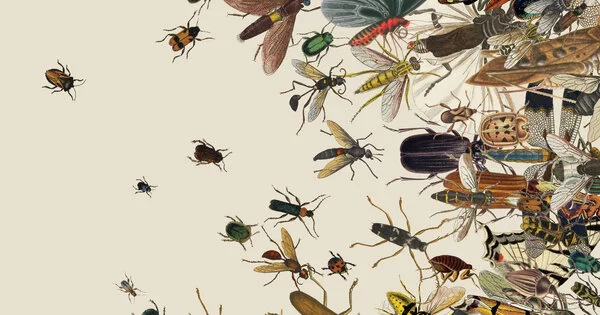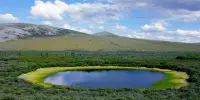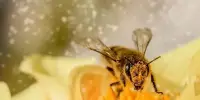According to a new study, the combined effects of climate change and expanding agriculture are causing insect populations to plummet in some parts of the world, with the abundance of bugs dropping by half in the hardest-hit areas. That is a major source of concern for both people and nature. Insects frequently contribute to the formation of natural ecosystems by pollinating plants, including agricultural crops, and providing an important food source for other animals.
A team of 70 scientists from 19 countries warned in a new scientific review that if no steps are taken to protect insects from the effects of climate change, it will “dramatically reduce our ability to build a sustainable future based on healthy, functional ecosystems.”
The team painted a bleak picture of the short- and long-term effects of climate change on insects, many of which have been declining for decades, using research from around the world. Scientists say that global warming and extreme weather events are already threatening the extinction of some insects, and that the situation will only worsen if current trends continue. Some insects will be forced to migrate to cooler climates in order to survive, while others will see changes in their fertility, life cycle, and interactions with other species.
Such drastic changes to ecosystems could eventually bite people, according to Anah Espndola, an assistant professor of entomology at the University of Maryland and one of the paper’s co-authors.
“We need to realize, as humans, that we are one species out of millions of species, and there’s no reason for us to assume that we’re never going to go extinct,” Espíndola said. “These changes to insects can affect our species in pretty drastic ways.”
We need to realize, as humans, that we are one species out of millions of species, and there’s no reason for us to assume that we’re never going to go extinct. These changes to insects can affect our species in pretty drastic ways.
Anah Espndola
Insects play an important role in ecosystems because they recycle nutrients and nourish organisms higher up the food chain, including humans. Furthermore, pollinators such as bees and butterflies are critical to the world’s food supply, and healthy ecosystems help keep pests and disease-carrying insects in check.
The team of scientists warned that these are just a few of the ecosystem services that could be jeopardized by climate change. Many insects, unlike mammals, are ectotherms, meaning they are unable to regulate their own body temperature. Because they are so dependent on external conditions, they may be more sensitive to climate change than other animals.
One way that insects cope with climate change is by shifting their range, or permanently relocating to places with lower temperatures. According to one study cited by Espíndola and other scientists, the ranges of nearly half of all insect species will diminish by 50% or more if the planet heats up 3.2°C. If warming is limited to 1.5°C – the goal of the global Paris Agreement on climate change – the ranges of 6% of insects will be affected.

Espndola, who studies how species respond to environmental changes over time, helped write the sections of the paper about range shifts. She explained that drastic changes in a species’ range can jeopardize its genetic diversity, potentially limiting its ability to adapt and survive.
Climate change, on the other hand, may increase the prevalence of some insects, to the detriment of human health and agriculture. Some disease vectors (such as mosquitoes) and crop-eating pests are expected to expand their geographical range as a result of global warming.
“Many pests are actually pretty generalist, so that means they are able to feed on many different types of plants,” Espíndola said. “And those are the insects that – based on the data – seem to be the least negatively affected by climate change.”
The team noted that the effects of climate change are frequently exacerbated by other human-caused impacts such as habitat loss, pollution, and invasive species introduction. These stressors, when combined, make it more difficult for insects to adapt to changes in their environment.
Even though insects are already feeling the effects, it is not too late to take action. The paper outlined policymakers’ and the general public’s options for protecting insects and their habitats. Scientists advocated for “transformative action” in six areas: the phase-out of fossil fuels, the reduction of air pollution, the restoration and permanent protection of ecosystems, the promotion of mostly plant-based diets, the transition to a circular economy, and the stabilization of the global human population.
The paper’s lead author, Jeffrey Harvey of the Netherlands Institute of Ecology (NIOO-KNAW) and Vrije Universiteit Amsterdam, said in a statement that urgent action is needed to protect insects and the ecosystems they support.
“Insects are tough little critters, and we should be relieved that there is still time to correct our mistakes,” Harvey said. “We urgently need policies to stabilize the global climate. Meanwhile, at both the government and individual levels, we can all work together to make urban and rural landscapes more insect-friendly.”
Individuals can help by managing public, private, or urban gardens and other green spaces in a more environmentally friendly manner, such as incorporating native plants into the mix and avoiding pesticides, as well as making significant changes in land usage when possible.













